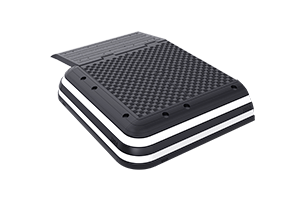The city of Toronto has opted for the Vectorial® system to solve the conflict between bicycles and public transport users and improve accessibility at tram stops in the King Street Priority Transit Corridor, in the heart of this Canadian city.
The Toronto City Council Department of Mobility launched in 2017 the pilot project to create a priority corridor for public transport on King Street, one of the main streets of its downtown. This street suffered from significant levels of congestion because of the large volume of private vehicles circulating on it.
The project, therefore, had the following objectives:
- To move people more efficiently.
- To promote economic activity.
- To improve the use of public space.
- To solve the conflict between two modes of transport (bicycles and streetcar) and pedestrians.
- To improve accessibility to the tram.
Accessibility to public transportation along this corridor was a key theme of this project. Toronto Transit Commission (TTC) streetcars do not allow level boarding, making it difficult for wheelchair users or people with reduced vision to gain access. With the elimination of one of the traffic lanes adjacent to the tramway, accessibility to streetcars has been improved by installing two Vectorial® system platforms in the following locations:
- King Street next to the intersection with Portland Street.
- King Street next to the intersection with Peter Street.

Their configuration allows bikes to run along the boarding area, along the extended curb. Bicyclists can ride through the boarding area when no transit vehicles are present but must yield the space to boarding and alighting passengers.




0 Comments